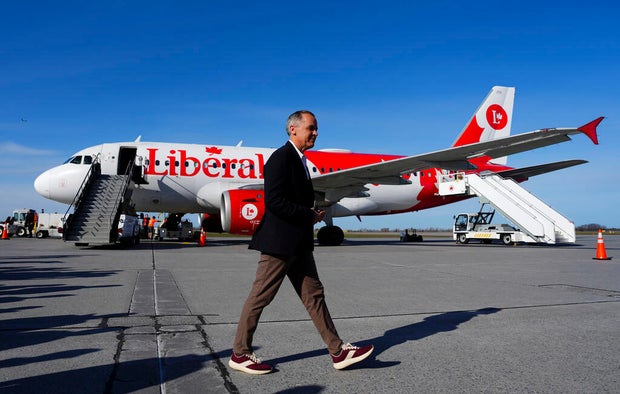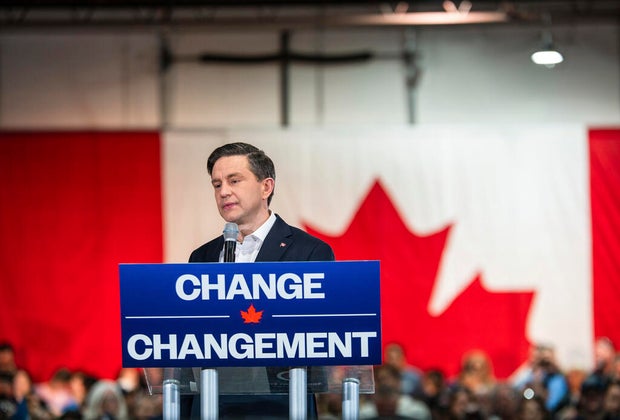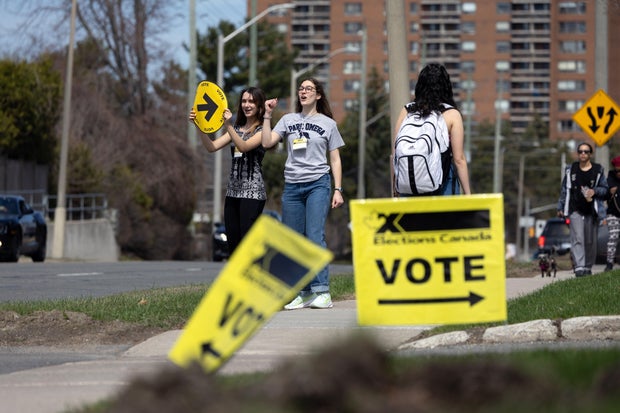Canadians headed to the polls on Monday for an election widely considered the most significant in a generation, as voters will determine who is best suited to manage the economy — and U.S. President Trump.
Canadians are deciding whether to continue the Liberal Party’s hold on power by picking new Prime Minister Mark Carney or transfer control to the Conservatives and their populist leader Pierre Poilievre.
Mr. Trump’s threat to annex Canada and his sweeping tariffs, which undermine the country’s economy, have dominated the campaign and influenced voters’ choices. Additionally, domestic issues such as affordability, immigration, jobs and crime remain significant factors.
According to Elections Canada, a record number of estimated 7.3 million Canadians cast their votes in advance voting, a 25% increase compared to the 2021 elections.
On Monday, a diverse group of voters gathered inside a school gym in Milton City, Ontario to cast their ballots. While they were divided on who would be best to deal with Mr. Trump, they all agreed that Canada’s sovereignty, tariffs and affordability were the main issues they considered while casting their vote.
“Trump’s decisions are affecting not just Canada but the rest of the world,” a couple who voted for the Liberals told CBS News outside a polling station. “The tariffs affected the market; it affected prices of all goods, food, anything.”
In the Canadian media, the conservative leader Poilievre has been cast as having similarities with Mr. Trump that could cost him.
“A couple of things that unfortunately, Pierre has come out with which we didn’t agree with us might sound silly, but the fact he wants to bring back plastic bags and straws, I didn’t like that idea,” the couple, who wished to remain anonymous, told CBS News
One voter named Peter said he considered the issue of sovereignty in relation to the U.S. while casting his vote. Although he did not specify which party he believed would best address concerns regarding Mr. Trump and protect Canadian sovereignty, he mentioned that a united Canada with a national approach would be the most effective way to deal with the U.S. president.
John Ivsky, a self-employed businessman from Milton, said he considered this election to be crucial, emphasizing that the issue of tariffs is significant and that Canada should seek more global partners.
“Canada needs to build its own economy and broader partnerships,” Ivsky told CBS News. “America shouldn’t be the only economic, military, or political partner. We need partners all over the world, so we don’t suffer from one political change in one country.”
He added: “I respect and vote for every party that can support family values, conservative values, freedom of speech, and I vote for the one that can reflect my beliefs, whether that’s Liberal or Conservative. At this point, Conservatives are the ones that can do that.”
On Monday, Mr. Trump once again injected himself into the election campaign. In a post on Truth Social, he repeated his idea of making Canada the 51st U.S. state and called on Canadian voters to vote for the person who could make his wish possible — without naming the political party.
“Good luck to the Great people of Canada. Elect the man who has the strength and wisdom to cut your taxes in half, increase your military power, for free, to the highest level in the World, have your Car, Steel, Aluminum, Lumber, Energy, and all other businesses, QUADRUPLE in size, WITH ZERO TARIFFS OR TAXES, if Canada becomes the cherished 51st State of the United States of America,” Mr. Trump said on Truth Social.
In response to Mr. Trump’s comments, Poilievre said Canada would never become the 51st state and urged the American president to stay out of Canadian elections.
“President Trump, stay out of our election. The only people who will decide the future of Canada are Canadians at the ballot box,” Poilievre said in French on social media. “Canada will always be proud, sovereign and independent and we will NEVER be the 51st State. Today Canadians can vote for change so we can strengthen our country, stand on our own two feet and stand up to America from a position of strength.”
In his campaign, Carney pleaded with voters to deliver him a strong mandate to deal with Mr. Trump.
“President Trump has some obsessive ideas, and that is one,” Carney said of his annexation threat. “It’s not a joke. It’s his very strong desire to make this happen. It’s one of the reasons why this crisis is so serious.”




